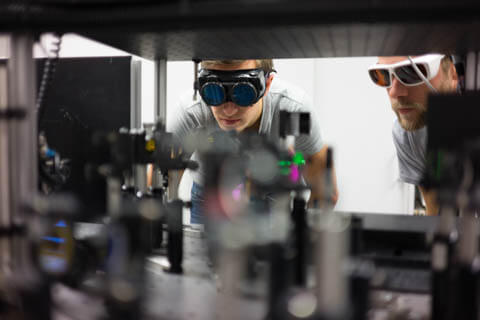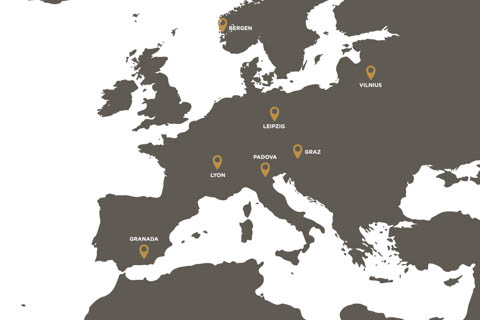 |
Faculty
Faculty of Physics
|
|

|
Scope of studies and length
120 ECTS credits, 2 years |
|

|
Qualification awarded
Master in Physical Sciences |
|

|
Application deadline*
1 May / 1 July |
|

|
Language
English |
|

|
Tuition fee per year
6 100 € for non-EU students
5 538 € for EU students |
|

|
Start of studies
1 September
|
 |
City
Vilnius |
APPLY NOW
Using the latest theoretical and practical knowledge and a modern basis of science and technologies in the environment of interdisciplinary studies, the Life and Chemical Physics studies programme is intended to educate highly-skilled specialists who are capable of professional research activities, and who are aiming to seek and develop scientific and technological solutions applicable in the fields of environmental science, materials research science and biomedicine.
Programme structure
| Course unit title |
ECTS
credits
|
|---|
| Course unit title |
ECTS
credits
|
|---|
|
1 semester
Compulsory courses
Environmental Physics
Applied Biophysics
Molecular Processes and Kinetic Spectroscopy
Chemical Physics
Elective courses
Radiation Ecology and Safety
Synergetics
Physical Kinetics
Photophysics and Technologies of Biosystems
|
30.0
5.0
5.0
5.0
5.0
5.0
5.0
5.0
5.0
|
|
2 semester
Compulsory courses
Experimental Spectrometry
Scientific Research Work I/II
Elective courses
Physics of Surfaces and Nanocompounds
Physical Electrochemistry
Optical Biosensors
|
30.0
10.0
10.0
5.0
5.0
5.0
|
|
3 semester
Compulsory courses
Digital Optics and Imaging
Biophotonics
Scientific Research Work II/II
Elective courses
Mass Spectroscopy
Modern Vibrational Spectroscopy
Physics of Heat and Mass Exchange
Applied Nuclear Spectrometry
|
30.0
5.0
5.0
10.0
5.0
5.0
5.0
5.0
|
|
4 semester
Compulsory courses
Master Thesis
|
30.0
30.0
|
Key Learning Outcomes
- A deeper understanding of theoretical physical background of modern spectroscopic techniques and an awareness of the contemporary tools and methods most widely used in the interdisciplinary experimental research areas related to environmental science, materials science, chemical physics and biomedical physics.
- Knowledge of the operation principles of the most advanced experimental equipment and techniques for the mathematical processing of digital data, as well as the practical skills of its application needed to conduct scientific research.
- A perception of the importance and of the methods for developing solutions to contemporary global problems in the areas of environmental pollution, radiation safety and protection and biomedical diagnostics, as well as an awareness of the scientific and technological breakthroughs that may be applied now, or will be applied soon in these areas.
- The ability to plan and perform a scientific study, to present scientific content to a professional audience, to work individually and in a multidisciplinary team of specialists, to constantly develop your professional and general knowledge, to exploit scientific and technical progress in a creative manner in the activities of scientific research, innovations and experimental development (SR&ED), in the interdisciplinary areas of physics and life sciences.
Programme Specific Requirements
- Completed university bachelor’s degree studies in physics or chemistry of the physical sciences study field group, materials technology and biotechnology field of the life sciences study field group or technological sciences study field group or other studies closely related to the aforementioned fields.
- In the diploma supplement: No less than 60 per cent of the volume of course units taken shall be in the fields of physics, mathematics, engineering, materials technology, nanotechnologies; the cumulative grade point average of these course units shall be no less than 60 per cent of the maximum possible grade. All course units must be passed (positively assessed).
- Additional points shall be awarded for scientific publications supported by bibliographic links and presentations at scientific conferences in the fields related to the study programme.
- The candidates meeting the aforementioned criteria are invited to the remote motivational interview. During the interview, the candidate’s determination to study in a master’s degree programme based on science is evaluated. If the interview is evaluated negatively, the candidate is not admitted to the study programme.
In addition, all applicants have to fulfil the general admission requirements.
Why Study at Vilnius University?
- Global outlook: 900+ international students from 74 different countries
- Ranked among the top 500 universities worldwide (QS)
- A European Union diploma
|
What comes after?
- The graduates of the programme can be harmoniously integrated into multidisciplinary research and production teams, as well as participating in practical high-tech manufacturing processes and businesses, and can manage technological production processes that require an interdisciplinary knowledge of physics, chemistry, medical physics and biophysics.
- They may choose to work in state expert, control and management institutions requiring competencies in the intersection of natural sciences.
- There is a possibility to continue a scientific career by entering third-level (doctoral) studies in the many fields of natural sciences available in the VU Institute of Chemical Physics.
|


